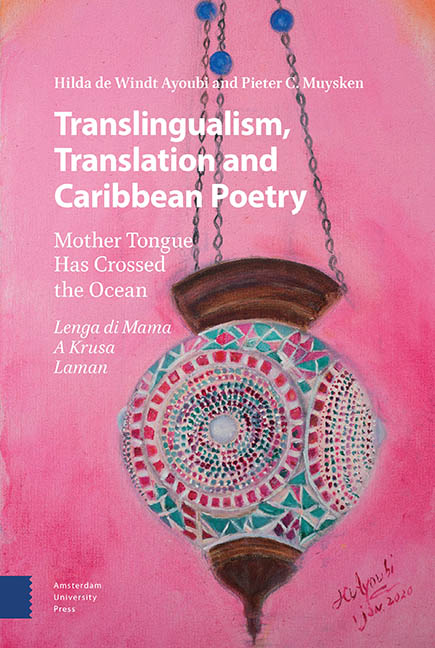Book contents
- Frontmatter
- Dedication
- Contents
- How to Navigate This Book: Kon Nabegá den e Buki akí
- Acknowledgements
- Preface
- Part 1 Introducing the Mother Tongue: Introdukshon di Lenga di Mama
- Part 2 The Poem “Lenga di Mama” and its Translations, Comments and Language Descriptions E Poema “Lenga di Mama” i su Tradukshonnan i Komentario i Deskripshon di e Idiomanan
- Part 3 The Poem “E ‘papiá’ di Papiamentu” and its Translations E Poema “E ‘papiá’ di Papiamentu” i su Tradukshonnan
- Part 4 The Poem “Papiamentu pa Semper” and its Translations E Poema “Papiamentu pa Semper” i su Tradukshonnan: The Translations and Editing of the Poem Hilda de Windt Ayoubi and Pieter Muysken (for Dutch)
- Part 5 The Poem “Riba Ala di Lenga di Mama” and its Translations E Poema “Riba Ala di Lenga di Mama” i su Tradukshonnan
- Part 6 Commentary: Komentario
- Note on the Authors: Informashon tokante e Outornan
- Index: Índise
Papiamento and Guene/Gueni : The Importance ofTranslation and Poetry for the Development andConservation of Mother Tongue: Papiamentu iGuene/Gueni: E Importansia di Tradukshon i Poesia paDesaroyo i Konservashon di Lenga di Mama
Published online by Cambridge University Press: 15 September 2022
- Frontmatter
- Dedication
- Contents
- How to Navigate This Book: Kon Nabegá den e Buki akí
- Acknowledgements
- Preface
- Part 1 Introducing the Mother Tongue: Introdukshon di Lenga di Mama
- Part 2 The Poem “Lenga di Mama” and its Translations, Comments and Language Descriptions E Poema “Lenga di Mama” i su Tradukshonnan i Komentario i Deskripshon di e Idiomanan
- Part 3 The Poem “E ‘papiá’ di Papiamentu” and its Translations E Poema “E ‘papiá’ di Papiamentu” i su Tradukshonnan
- Part 4 The Poem “Papiamentu pa Semper” and its Translations E Poema “Papiamentu pa Semper” i su Tradukshonnan: The Translations and Editing of the Poem Hilda de Windt Ayoubi and Pieter Muysken (for Dutch)
- Part 5 The Poem “Riba Ala di Lenga di Mama” and its Translations E Poema “Riba Ala di Lenga di Mama” i su Tradukshonnan
- Part 6 Commentary: Komentario
- Note on the Authors: Informashon tokante e Outornan
- Index: Índise
Summary
Introduction
Before giving an outline on the importance oftranslation and poetry for the conservation ofmother tongue, I will first give a brief descriptionof Papiamento, its origins, its introduction in theeducation and its music.
Papiamento is the main language of the Dutch LeewardIslands, Curaçao, Aruba and Bonaire. But nowadays itis also used to some extent on the three DutchWindward Islands, St. Maarten, St. Eustatius andSaba.
Furthermore, educational necessities and individualeconomic conditions have forced many Papiamentospeakers to move to the Netherlands, creating aPapiamento-speaking community there, consisting ofat least 150.000 people. The Papiamento they speakis often heavily influenced by Dutch, leading to thelabel “Papiamento made in Holland” (Martinus 1996:7).
Papiamento is also a recognized language in the Dutchpublic bodies of Bonaire, St. Eustatius, andSaba.
The Name
The name Papiamento stems from the Papiamento verbpapia “to speak” andthe noun forming morpheme -mentu.Papia and Papea are known as verbs inCape Verdean Creole, Guine Bissau Creole andSaramaccan (Saramaccan: papiapapia “small talk”). It may, therefore,be derived from the Portuguese verb papear “to chatter”. ThisPortuguese verb in turn probably goes back to aFrench verb papier,which is given as “to stammer” or to “speak”(Martinus 1996: 6).
Origins
The current consensus on the origin of Papiamento isthat it is an Afro-Portuguese Creole language (Romer1985: 367). Still, due to the considerable lexicalinfluence that Spanish has exercised on Papiamento,there is a group of authors that considersPapiamento a Spanish based Creole language. A greatpart of the lexicon, however, that is consideredSpanish may have other Romance origins, e.g. Frenchor Portuguese.
As a Portuguese Creole language, Papiamento developedamongst several other Afro-Portuguese dialects (CapeVerdean Creole, Guine Bissau Creole, A Mina Creoleand Angolan/Congolese Creole) brought to theNetherlands Antilles soon after the Dutch conquestin 1634. Sometimes these Creole variations alsocontain typical Brazilian (Amerindian) words, whichcould have been picked up, amongst others, either inBrazil or at A Mina (Martinus 1996).
- Type
- Chapter
- Information
- Translingualism, Translation and Caribbean PoetryMother Tongue Has Crossed the Ocean, pp. 35 - 54Publisher: Amsterdam University PressPrint publication year: 2022

